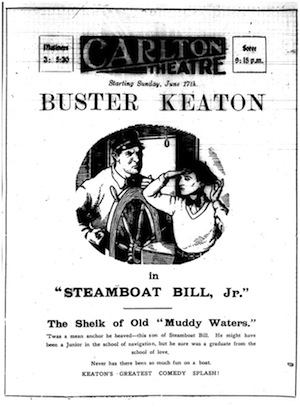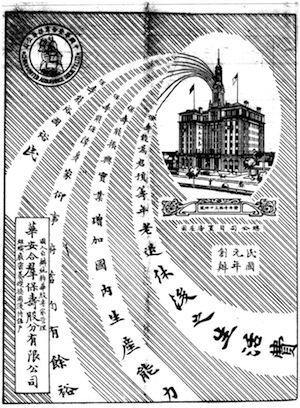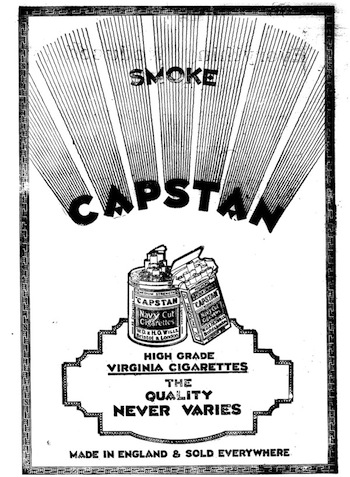FEATURES
The China Critic - 1928 | China Heritage Quarterly
The China Critic: a Chronology
William Sima
Australian Centre on China in the World
William Sima, whose research into the history and contents of The China Critic led to this combined issue of China Heritage Quarterly, has created a Chronology of the weekly. It follows the progress of The Critic from its first appearance in May 1928 through the highs and lows of the 'Nanjing Decade', and then through its various wartime permutations.
Will's Chronology, which is arranged by year below, accounts for the changing fate, and the friable editorial stance, of The Critic. It also provides numerous links to the articles under discussion allowing for them to be appreciated in an historical context.—The Editor
1928 | 1929 | 1930 | 1931 | 1932 | 1933 | 1934 | 1935 | 1936 | 1937 | 1938 | 1939 | 1940 | 1945
1928
31 May

Fig.1 Buster Keaton's 'Steamboat Bill, Jr.', playing at the Carlton Theatre, June 14
The inaugural issue of The China Critic carries editorials describing fighting, earlier in May, between the Nationalist forces of Chiang Kai-shek and Japanese troops stationed in Shandong; an event known as the 'Tsinan [Jinan 濟南] Affair'.
Against this backdrop, the newspaper's 'Foreword' describes a mission to fulfill 'the need [which has] long been felt for a representative publication independent alike of government control and popular prejudices'. This brief manifesto of what we call 'The China Critic Group' promises to 'be just to all, ready to defend China's rights and equally ready to admit her shortcomings … to strengthen the friendly relations between China and the outside world … [in the hope that we may] prevent the repetition of events that have made the month of May so unhappily memorable.'
9 August
Quoting G.K. Chesterton from the London Illustrated News in his opening paragraph, T.F. Hsiang asks 'Is the Idealism of the Kuomintang Dead?' The article questions whether the Kuomintang, given the recent challenges of the Northern Expedition, national unification and the loss of Soviet support,will be able to maintain its commitment to the social ideals of its founder Sun Yat-sen. Hsiang argues that 'the record of the Kuomintang is barren of achievement in the social sphere'; he warns that 'the Party should not confuse the end of the Northern Expedition with the end of the revolution'; in concluding, however, he states that 'we should wait till the first administration of the Kuomintang is pretty well on its way, before we pronounce its ideals dead.'

Fig.2 Advertisement for the 'China United Assurance Society Ltd.' 華安合群保壽股份公司, June 21
23 August
Quentin Pan's 潘光旦 article 'The Problem of the Cultural Hybrid' describes the dilemmas faced by Chinese scholars and professionals returned to their homeland after studying abroad. He cautions that their new attitudes and the habits they have acquired overseas can often lead to problems. Towards the end of the essay he offers the following advice:
Studying abroad per se must cease to be the cultural ideal of many well-to-do families and aspiring youths. The general public must learn to look upon it no longer as something in itself laudable, but rather as a dangerous experiment to launch upon both for the individual and for the community, which he will come back to serve.
(For more on Pan Guangdan, see 'Quentin Pan and The China Critic', by Leon Rocha, in the 'Features' section of this issue.)
30 August
In his capacity as the first mayor of Nanjing under the new Nationalist/Kuomintang administration, Chi-wen Liu 劉紀文 provides a blueprint for developing the capital in his essay 'The Municipal Administration of Nanking'. His 'plan for a new metropolis, basing [sic] on many years study and observation of municipal administration' in Europe, the US and Japan, outlines with the fundamental task of constructing new roads, and includes the need to train a new police force, suppress prostitution and gambling, and improve the city's water supply and public hygiene.
6 September
In his article 'Peking or Nanking?' Li Tz-hyung 李芷馨 discusses the relocation of the Chinese capital in historical perspective. While admitting the negative effects that this change will have upon Beijing (now renamed Beiping), the author expresses sympathy with the 'poor-fed, poor-clad and underpaid' soldiers who fought during the Northern Expedition. He welcomes the change as it accords with Sun Yat-sen's plan for a new Chinese capital:
In this difficult time of adjustment, the virtues of patience and confidence cannot be too strongly urged. Mutual trust and sincerity of purpose will go far to entrench ourselves. There must be a willingness to sacrifice personal, regional interests for the sake of the greater and nobler interests of the nation.
He goes on to compare China's relocation of its capital 'from the standpoint of history', to similar developments in Japan, Russia and Turkey.
13 September
Contrary to the 'optimists and pessimists' in modern scholarship about China, who rejoice and despair respectively at the prospect that China has no religion, Hu Shih 胡適 argues in 'The Religion of Names' that Chinese tradition espouses a 'trust and worship [of the] omnipotence of names'. This essay, translated by The Critic's editors from the original, explores the ways in which names and slogans have been integral to Chinese cultural discourse for thousands of years, so much so that they can be regarded as being equivalent to a 'religion'. In conclusion Hu writes: 'Finally, we may attempt to be up-to-date and compose two slogans: Down with slogans! Down with the Religion of Names! Up with the Republic of China!'

Fig.3 An advertisement for Capstan Cigarettes, 8 November. Decorative advertisements for this brand appeared in the pages of The China Critic on nearly a weekly basis
8 November
The Editorial 'Significant Missions to Nanking' offers a summary of notable foreign commercial and diplomatic missions to Nanjing since its inauguration as capital.
Also in this issue, Sun Fo 孫科 (son of Sun Yat-sen), at this time president of the Examination Yuan and Minister of Railways, provides 'A Draft Scheme of Reconstruction' in a response to requests from the Chinese press. The China Critic presents the first part of the Scheme in translation here. The scheme deals primarily with the construction of new railways and other public works.
27 December
The Editorial 'Journalistic Ethics' is an indictment of pompous and self-important foreign journalists. They are divided into those who are 'honest' (the most rare type), 'jingoists', 'tools' and 'those who consider themselves as a kind of merchandise' (as common as each other). The writer of the Editorial presents Tasman Ile as the paradigm of such a foreign correspondent:
The Critic is glad to say that among the numerous foreign correspondents, with whom its board of editors may claim acquaintance, there are very few who answer to the description in the above paragraphs. Perhaps the average is only as bad as 'Tasman Ile', a 'former Shanghai journalist', who wrote Shanghai Nights, in which he said 'You'll damn well know who I am if you don't get out of the way—I'll have your rotten joint closed down in a week—I'm a newspaperman if you want to know, from the press, two more words out of you and your dump gets so much limelight you'll lost your license!'
The writer declares that: 'We [at The Critic] do not mean to indict the whole journalists profession in China', and admits that honest foreign correspondents do exist. 'But alas! how few are such men; and their voices never reach as far as those who are not as reliable, but who make it a point to blow their own trumpets.'
1928 | 1929 | 1930 | 1931 | 1932 | 1933 | 1934 | 1935 | 1936 | 1937 | 1938 | 1939 | 1940 | 1945
|